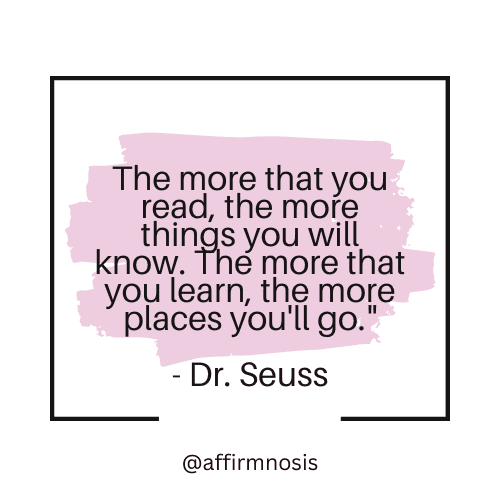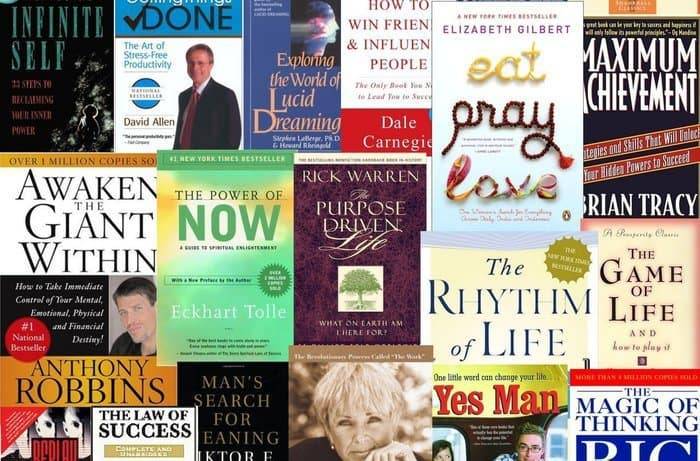Personal development books are a genre of literature that focuses on helping individuals improve their personal and professional lives. They cover a wide range of topics, including but not limited to mindfulness, emotional intelligence, leadership, productivity, and financial literacy.
Personal development books are often written by experts in the field or individuals who have experienced significant personal growth themselves.
The Definition of Personal Development Books
Personal development books can be defined as literature that aims to improve an individual’s quality of life through personal growth and self-improvement.
These books typically offer practical advice and actionable steps for readers to follow in order to achieve their goals. In some ways, personal development books can be seen as an extension of the self-help genre.
However, unlike traditional self-help books which may focus on specific problems such as addiction or depression, personal development books aim to help readers achieve overall personal growth and fulfillment.
Personal development books can take many different forms, including motivational speeches transcribed into book form, scientific studies backed with empirical evidence or memoirs of successful people’s struggles both in life and entrepreneurship.
The Importance of Personal Development in One’s Life
The importance of personal development is difficult to overstate. By promoting self-awareness and encouraging individuals to explore their full potential, it can lead to a greater sense of purpose and fulfillment in one’s life.
Through reading these types of resources we gain knowledge about our own behaviour patterns thus increasing our abilities for introspection so that we may better ourselves.
Effective communication skills learned from certain writers like Dale Carnegie can help us thrive within social contexts while learning concepts like time management from authors like Brian Tracy will help you reach your goals more efficiently than before. In today’s fast-paced world, personal development has become more important than ever before.
With the constant evolution of technology and industries, individuals must continuously adapt and improve in order to stay relevant. Personal development books offer a way for individuals to stay ahead of the curve both professionally and personally.
Whether an individual is seeking professional success or personal fulfillment, personal development books can provide valuable insights and guidance on how to achieve their goals.
Through reading these resources we gain knowledge about our own behavioural patterns thus increasing our abilities for introspection so that we may better ourselves
High-Level Overview of Personal Development Books
Brief History and Evolution of Personal Development Books
Personal development books have been around for centuries, with the earliest known examples dating back to ancient Greece. Philosophers such as Socrates, Plato, and Aristotle wrote about the importance of self-improvement and introspection. However, it wasn’t until the 20th century that personal development books became widely popular.
In the early 1900s, Napoleon Hill’s “Think and Grow Rich” was published and quickly became a bestseller. This book paved the way for other personal development classics such as Dale Carnegie’s “How to Win Friends and Influence People” and Norman Vincent Peale’s “The Power of Positive Thinking.” These books emphasized the power of mindset and positivity in achieving success.
In the 1960s and 70s, personal development books took on a more spiritual tone with authors such as Wayne Dyer and Deepak Chopra writing about mindfulness, meditation, and connecting with one’s inner self. This trend continued into the 80s with Stephen Covey’s “The 7 Habits of Highly Effective People” which focused on leadership skills.
Today, personal development books cover a wide range of topics from financial literacy to emotional intelligence to productivity hacks. The genre has evolved to include not only traditional print books but also audiobooks, e-books, podcasts, webinars, online courses, and more.
Popular Authors and Their Contributions to the Genre
There are countless authors who have made significant contributions to the personal development genre over the years. Here are just a few:
Tony Robbins: Robbins is perhaps one of the most well-known motivational speakers in the world. He has written several best-selling books including “Awaken The Giant Within” which teaches readers how to take control of their lives through mindset and action.
Tim Ferriss: Ferriss is known for his “4 Hour” books which offer unconventional strategies for increasing productivity, fitness, and happiness. His most popular book, “The 4-Hour Workweek,” has been translated into 40 languages.
Brene Brown: Brown is a researcher and storyteller who focuses on vulnerability, shame, and empathy. Her TED talk on vulnerability has over 58 million views and her book “Daring Greatly” has become a staple in the personal development genre.
Malcolm Gladwell: Gladwell is a journalist who writes about social psychology and human behavior. His books such as “The Tipping Point” and “Blink” have helped readers understand how small changes can make a big impact.
These authors have not only written best-selling books but have also become sought-after speakers, coaches, and consultants in their respective fields. Their contributions to the personal development genre have helped millions of people improve their lives both personally and professionally.
Mindfulness and Meditation: The Art of Being Present and Self-Aware
Personal development books on mindfulness and meditation have become increasingly popular in recent years, especially in a world that is becoming more fast-paced and stressful.
These books teach readers how to be present in the moment, recognize their thoughts and emotions, and become more self-aware. Mindfulness can help individuals manage anxiety, stress, depression, and improve their mental well-being.
One of the most popular books on mindfulness is “The Power of Now” by Eckhart Tolle. This book teaches readers how to live in the present moment by letting go of past regrets or worries about the future.
Another great book is “Mindfulness: An Eight-Week Plan for Finding Peace in a Frantic World” by Mark Williams and Danny Penman. This guide offers a step-by-step approach to mindfulness through meditation practices.
Emotional Intelligence: Understanding Your Emotions and Others’
Personal development books on emotional intelligence (EI) focus on developing skills for understanding one’s own emotions as well as those of others.
EI is important for personal growth as it allows individuals to recognize their behavior patterns, improve communication skills, develop empathy, and build stronger relationships. “The Emotional Intelligence Quick Book” by Travis Bradberry gives readers practical tips for improving EI at home or work.
Bradberry emphasizes developing self-awareness as a foundational skill before moving onto other aspects such as self-regulation or social awareness. “Emotional Agility” by Susan David explores how emotional agility can be developed through various tools such as mindfulness practices or reframing negative thoughts.
Leadership and Management: Lessons from Successful Individuals
Personal development books on leadership focus on developing skills necessary for effective management of oneself or teams.
These books cover topics such as decision-making strategies, communication techniques & problem-solving tools that can be applied across various industries. “Good to Great” by Jim Collins is a classic in the genre and analyzes what sets great companies apart from average ones.
This book offers insights into how lasting change can be brought about through focus on discipline, innovation, and leadership. “The 7 Habits of Highly Effective People” by Stephen Covey is another classic that focuses on developing habits that lead to success such as prioritizing tasks, setting goals, and building relationships.
Time Management and Productivity: Making the Most of Your Time
Personal development books on time management and productivity cover strategies for getting more done in less time.
These books often provide insight into how successful individuals manage their time effectively & efficiently. “The One Thing” by Gary Keller emphasizes the importance of prioritizing one’s tasks to achieve maximum productivity.
This book offers practical advice on how to focus one’s energy on high-leverage activities, building long-term habits & developing discipline. Another popular book is “Getting Things Done” by David Allen which teaches readers how to organize their tasks effectively using a simple system.
Financial Literacy and Wealth Creation: Building Prosperity Through Knowledge
Personal development books on financial literacy and wealth creation teach readers about investing, budgeting, money management strategies & creating multiple revenue streams.
These books can help individuals develop a better understanding of personal finance as well as practical tools for achieving financial independence.
“The Richest Man in Babylon” by George S Clason is a classic personal finance book that teaches readers timeless money-management principles such as saving regularly & living within one’s means.
Another great book is “Rich Dad Poor Dad” by Robert Kiyosaki which highlights the importance of investing in assets rather than liabilities & developing financial intelligence.
Rarely Known Small Details in Personal Development Books
The Impact of Positive Affirmations on the Brain
Positive affirmations are statements that one repeats to oneself to encourage positive thinking and behavior. They are a popular tool in personal development books as they help reshape one’s mindset by focusing on the positive rather than the negative.
There is growing scientific evidence that positive affirmations can have a significant impact on the brain and overall well-being.
When people repeat positive affirmations, it activates specific neural pathways in their brains, leading to an increase in feel-good hormones such as dopamine and serotonin. These hormones enhance mood and reduce stress levels.
Furthermore, repeating positive affirmations can improve self-esteem, boost confidence, and lead to more optimistic thinking patterns. However, it is important to note that not all affirmations work equally well for everyone.
The key is finding affirmations that resonate with you and your values. Additionally, repetition is essential for creating lasting change in your thought patterns.

The Science Behind Visualization Techniques
Visualization techniques involve using mental imagery or visualization exercises to achieve a specific goal or outcome. These techniques are commonly used in personal development books as they help individuals focus their minds on a desired outcome which can increase motivation and improve performance.
The science behind visualization suggests that mental imagery can activate similar brain regions as actual physical experiences. This means simply imagining yourself performing specific tasks or achieving goals may lead to an improved ability to execute those tasks or attain those goals.
Studies have also shown that athletes who use visualization techniques experience improved performance compared to those who do not use them.
The same principle applies outside of sports – visualizing success may lead individuals towards achieving their goals by keeping them focused on what they want.
How Gratitude Can Improve Overall Well-being
Gratitude is defined as feeling thankful or appreciative of something good that has happened in one’s life. It is a simple but powerful concept studied extensively by psychologists and personal development experts alike.
Research has shown that expressing gratitude can lead to significant improvements in overall well-being.
People who practice gratitude report feeling happier, less stressed, and more content with their lives. Additionally, expressing gratitude can improve relationships as it fosters feelings of goodwill and positivity towards others.
Gratitude can be practiced in many ways such as keeping a daily gratitude journal or simply taking a moment to reflect on what you are grateful for each day.
Gratitude exercises can also be combined with other techniques such as visualization or positive affirmations.
Overall, these rarely known small details provide valuable insights into the science behind personal development practices that go beyond surface level understanding.
Understanding the impact of positive affirmations, visualization techniques, and practicing gratitude can lead to enormous benefits in improving overall well-being and achieving personal goals.
The Power of Personal Development Books: Benefits You Can’t Ignore
Reading personal development books can have a profound impact on the way you view yourself, your life, and the world around you. Here are some of the most significant benefits of incorporating these books into your daily routine:
Improved Self-Awareness and Self-Esteem
Personal development books can help you develop a deeper understanding of yourself, including your strengths, weaknesses, values, and beliefs.
They can also provide practical tools for enhancing your self-esteem by helping you identify and challenge negative thought patterns that may be holding you back.
For example, books on mindfulness may teach you how to observe your thoughts without judgment and accept them as they are. This practice can help you become more self-aware and less reactive to difficult emotions or situations.
Similarly, books on emotional intelligence can teach you how to recognize and regulate your emotions effectively. By increasing your self-awareness and self-esteem through personal development reading materials, you’ll be better equipped to make positive changes in your life and maintain a sense of inner peace.
Enhanced Decision-Making Skills
Reading personal development books can also improve your decision-making skills by providing new perspectives on old problems. Many authors offer practical advice for making difficult decisions or breaking through mental barriers that may be preventing progress in certain areas of life.
For example, if you struggle with decision-making at work or in relationships, books on leadership or communication skills could provide valuable insights into effective ways of communicating with others.
By honing decision-making skills through personal growth literature, you’ll gain greater confidence in yourself as well as the choices that affect important aspects of life such as career choices or relationships.
Increased Motivation and Inspiration
Personal development books are known for their ability to provide motivation and inspiration when individuals need it most. Whether it’s exploring innovative techniques for managing time, setting goals, or creating a new lifestyle, many books offer insights and tools that can help individuals achieve their dreams.
For example, books on financial literacy can provide straightforward advice for managing money effectively and achieving financial goals.
Books on leadership or management can offer inspiration and motivation to lead a team more effectively.
By providing practical tips and techniques for overcoming obstacles and pushing forward toward success, these books can be a powerful source of motivation and inspiration. They may also help you re-ignite or discover passions that you may have forgotten about over time.
Incorporating personal development literature into your routine can have numerous benefits in terms of self-awareness, decision-making skills, motivation, and inspiration. So pick up those books today! You’ll be surprised at how much they can change your life.
Criticisms of Personal Development Books
Overemphasis on Individualism
Personal development books often place a strong emphasis on individualism, promoting the idea that success and growth are solely dependent on one’s personal efforts.
This can lead to a “blame the victim” mentality, where individuals are held solely responsible for their circumstances, regardless of external factors such as systemic inequalities or societal barriers.
While personal responsibility is important in achieving goals, it is also crucial to recognize the impact of external factors beyond one’s control. Furthermore, an overemphasis on individualism can lead to a sense of isolation and disconnection from others.
When people are encouraged to focus solely on themselves and their own growth, there can be a lack of attention given to building relationships and communities.
This can result in a society that prioritizes individual success over collective well-being.
Overall, while personal development books offer valuable insights into self-improvement, it is important to keep in mind the larger social context in which individuals operate. Success and growth are not solely dependent on our own efforts – external factors play a role as well.
Lack of Scientific Evidence to Support Some Claims
While many personal development books offer sound advice backed by research studies and empirical evidence, others make claims without sufficient scientific support.
Some authors may rely heavily on anecdotal evidence or personal experiences rather than empirical data.
For example, some books may promote pseudoscientific concepts such as the law of attraction or positive thinking without providing concrete evidence for their effectiveness. While these ideas may have some merit in certain contexts, they should be approached critically and with a healthy dose of skepticism.
It is important for readers to approach personal development books with a critical eye and consider whether claims made by authors are grounded in scientific research or simply based on speculation or opinion.
As with any form of self-improvement literature, it is important to weigh the evidence and consider the source before adopting any particular approach.
Overall, while personal development books can be valuable resources for growth and self-improvement, it is important to approach them critically and with a discerning eye.
By understanding their potential limitations and keeping a balanced perspective, readers can make the most of these resources while avoiding unnecessary pitfalls.
Conclusion
Personal development books have evolved from traditional self-help guides to encompass a broader range of topics such as mindfulness, emotional intelligence, leadership and management, time management, productivity, financial literacy, and wealth creation.
These books offer readers valuable insights into how to improve their lives by developing various skills that can help them reach their full potential. Notably, the positive effects of reading personal development books are manifold.
They help readers cultivate self-awareness and self-esteem, enhance decision-making skills, increase motivation and inspiration. The science behind these concepts is becoming more apparent as studies show that positive affirmations can impact brain function while gratitude can improve overall well-being.
While some criticisms exist regarding personal development books’ emphasis on individualism and lack of scientific evidence to support some claims made in these works.
However, readers must take a balanced approach when evaluating the value gained from reading personal development books.
Encouragement for Readers to Explore Personal Development Books as a Tool for Growth
Personal development books are an excellent tool for those who seek self-improvement and growth in various areas of life. They provide readers with new perspectives on how they may approach their daily lives or how they might change aspects of themselves or their environments that are not working well.
Ultimately it is up to each reader to decide if personal development literature will contribute positively towards their path.
However it is certainly worth giving this type of literature a chance- who knows what one might discover through reading even one inspired work? Maybe something ground-breaking; perhaps something small but still worth considering regardless- yet even then it could make all the difference in leading towards happier days ahead!
Quotes on the importance of reading and self-improvement.
- “Reading is to the mind, what exercise is to the body.” – Joseph Addison
- “The reading of all good books is like a conversation with the finest minds of past centuries.” – Rene Descartes
- “Books are mirrors: you only see in them what you already have inside you.” – Carlos Ruiz Zafón
- “The more that you read, the more things you will know. The more that you learn, the more places you’ll go.” – Dr. Seuss
- “Books serve to show a man that those original thoughts of his aren’t very new after all.” – Abraham Lincoln
- “Reading is essential for those who seek to rise above the ordinary.” – Jim Rohn
- “A reader lives a thousand lives before he dies. The man who never reads lives only one.” – George R.R. Martin
- “In my whole life, I have known no wise people (over a broad subject matter area) who didn’t read all the time – none, zero.” – Charlie Munger
- “Books are a uniquely portable magic.” – Stephen King
- “There is more treasure in books than in all the pirate’s loot on Treasure Island.” – Walt Disney
These quotes emphasize the transformative power of reading, its role in self-discovery, and its potential to bring about a sense of wisdom and understanding.




























































